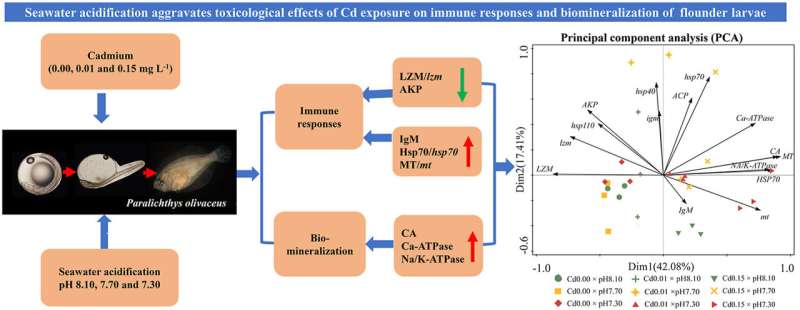How cadmium affects larval flounder under seawater acidification

Seawater acidification is a major threat to both calcifying and non-calcifying marine organisms, mostly affecting the immune system and biomineralization or the acid-base regulatory system.
Previous studies have found that seawater acidification can affect the solubility, adsorption and toxicity of metals to marine organisms, which greatly depends on the physical and chemical forms of the metals.
Recently, Cui Wenting from the research team led by Prof. Dou Shuozeng at the Institute of Oceanology of the Chinese Academy of Sciences (IOCAS) investigated the toxicological effects of cadmium (Cd) on the immune response and biomineralization of larval flounder Paralichthys olivaceus under seawater acidification.
The study was published in Chemosphere.
The results showed that single seawater acidification, single Cd exposure and combined exposure significantly affected the activities, contents and expressions of immune system-related enzymes, proteins and genes.
Specifically, lysozyme (LZM) activity was inhibited by single seawater acidification and single Cd exposure, and the lzm expression was downregulated under Cd exposure, indicating an innate immunosuppression. Contents of immunoglobulin M(IgM), heat shock 70 (HSP70) and metallothionein (MT) were induced by seawater acidification or Cd exposure.
In addition, the expressions of hsp70 and mt were synchronously upregulated under Cd exposure, indicating a detoxification mechanism that responded to the stressors.
Of the biomineralization-related enzymes, activities of carbonic anhydrase (CA), Na+/K+-ATPase and Ca2+-ATPase were induced by single seawater acidification and single Cd exposure, a potential mechanism in response to changes of acid-base balance induced by the stressors.
This study demonstrated that immune and biomineralization of the flounder responded more sensitively to Cd exposure than seawater acidification. Seawater acidification could aggravate the toxicological effects of Cd exposure on the two physiological functions, while high Cd exposure augmented their responses to seawater acidification.
More information: Wenting Cui et al, Toxicological effects of cadmium on the immune response and biomineralization of larval flounder Paralichthys olivaceus under seawater acidification, Chemosphere (2021). DOI: 10.1016/j.chemosphere.2021.132919
Journal information: Chemosphere
Provided by Chinese Academy of Sciences




















